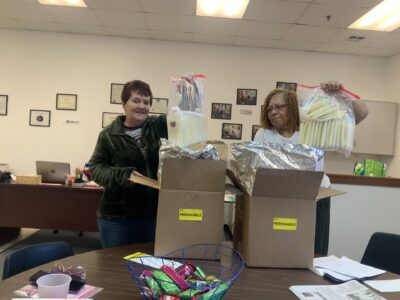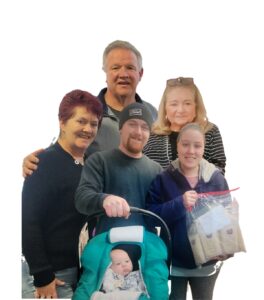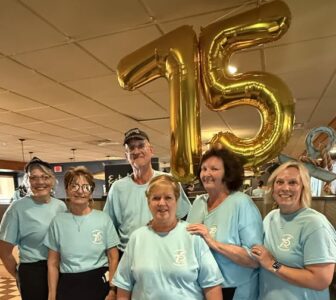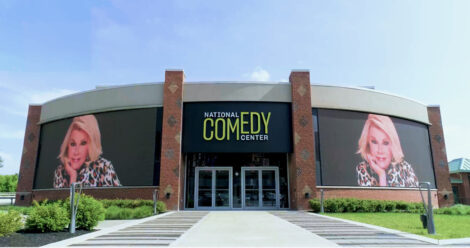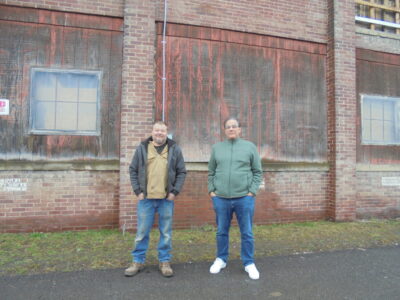Baby Cafe Receives Large Donation For Milk Bank
- Tonia Mosher, board member and Joyce Bess Cafe Certified Lactation Counselor, getting ready to ship the milk out.
- Left to right board members Tonia Mosher, County legislator Dave Wilfong, Deb Robins and Ashley and Phil Starkweather. Submitted photo

Tonia Mosher, board member and Joyce Bess Cafe Certified Lactation Counselor, getting ready to ship the milk out.
Blackwell Chapel Baby Cafe has recently received a donation of 461 ounces of breast milk donated by a Chautauqua County family for its depot that is a part of the New York Milk Bank.
The New York Milk Bank, located in Valhalla, provides pasteurized donor human milk when mothers’ own milk is insufficient or not available. Their top priority is to provide donor milk to hospitalized premature infants. They opened in 2016 in Hastings before moving to the larger facility in 2018.
In the last seven years, they have distributed more than 1 million ounces of milk, screened over 5,000 donors and have a network of 26 milk banks across the state.
Blackwell Baby Cafe officially opened as a depot in December.
Donated breast milk helps many critically ill or low birth weight babies and mothers who may not be able to use their own milk.

Left to right board members Tonia Mosher, County legislator Dave Wilfong, Deb Robins and Ashley and Phil Starkweather. Submitted photo
“Donated breast milk is an incredibly important part of postnatal care in the modern world,” said Catherine Harrison, coordinator of the depot with Baby Cafe. “Access to donor milk allows babies who cannot breastfeed to get all the nutrients and unique benefits of human milk, helping to support their immune systems, their growth and development, and their overall health and wellbeing.”
Harrison added that across the globe countless women are facing challenges and risks when it comes to accessing maternal healthcare.
“We at the Baby Cafe continue to try and educate expectant mothers and their families about prenatal and postpartum care, empower these mothers to make informed decisions and guide women through steps to maintain a healthy infant,” Harrison said. “We have many community organizations, and public health professionals working together to make Chautauqua County a safer and more equitable place to give birth across all levels of care. The Cafe supports quality improvement and alignment with other state initiatives to promote a safe birthing experience resulting in improved outcomes for all. We will continue laying the groundwork for long-term family well-being as specified by the team of Joyce Bess, Certified Lactation Counselors, and Deb Robins RN, BSN, MPA.”
The recent donation of 461 ounces was given by Ashley and Phil Starkweather.
“The process was easy,” Ashley Starkweather said. “There were four steps: A phone call, an email with the same questions as the phone call, a doctor’s release, then blood work and the Milk Depot paid for it all.”
In order to donate at any milk depot in the state a donor must first go through the screening process, beginning by visiting the Milk Bank’s website (nymilkbank.org/donate-your-milk/ ). There donors can complete the preliminary donation form, or another option to express interest is calling 212-956-6455 extension 109.
The four step screening process involves a screening call which is a 15-minute call to establish eligibility, followed by completing and returning the Milk Donor Application and Medical Release, a free blood test, where donors can visit a designated lab at no cost, and then finally reaching the milk donation step where donors can either ship milk to the bank or drop it off at a depot, such as the Blackwell Chapel.
Donated milk that is received is also tested and pasteurized. Potential milk donors provide complete medical and lifestyle histories, and undergo blood tests for HIV, HTLV, syphilis, and hepatitis B and C, similar to the screening process used at blood banks. Donated milk is then tested for bacteria and nutritional composition and pasteurized to kill any bacteria and viruses. Use of tobacco, drugs or alcohol can disqualify someone from donating, along with the donor or their partner having received blood transfusions or transplants in the last 12 months.
Rachel Granger, executive director with the NY Milk Bank, explained the pasteurization steps.
“The donor milk arrives frozen and is gently thawed in our refrigerators before it’s ready to be bottled,” Granger said. “All equipment is washed and sanitized in our commercial dishwashers. Each lab technician carefully scrubs their hands and puts on protective garments. The thawed milk is poured through a strainer into glass flasks and pooled with milk from multiple donors.” Once pooled, the milk is thoroughly mixed to promote an even distribution of nutritional components, then poured into bottles, sealed, and placed into pasteurizers.
“Pasteurization is a process that heats and then cools the milk to eliminate harmful bacteria,” Granger said. “Pasteurized milk is analyzed in our Miris Human Milk Analyzer for energy and protein content. A sample from each batch is sent to a lab to check for bacterial growth. Once cleared, the batch is ready for distribution. Following pasteurization and testing, the bottles are frozen, placed in our inventory, and ready for distribution to hospitals and outpatient families.”
Granger said people should be interested in donating their breast milk because pasteurized human milk can save the lives of infants, providing a combination of nutrients, as well as important antibodies. These components cannot be completely replicated in any other source of nutrition. For premature and medically fragile babies, it can be a medical necessity. Donated breast milk can strengthen the baby’s immune system, is easier to digest than most formulas and helps infants fight diseases and infections.
Granger said Blackwell Chapel is an important part of this process as a depot, and expressed her gratitude to the team.
Harrison said at the Baby Cafe, they work to increasingly provide compassion that is non-judgmental and allows clients to gain trust.
“Their insight then sheds light on any underlying social, economic, or emotional challenges that may impact a mother’s health and well-being,” Harrison said. “There are many health and quality-to-life benefits to the mother and babies because the benefits result in huge cost savings to the healthcare system and employers. Educating these mothers will reduce recurrence of adverse birth outcomes and improve birth spacing.”
Harrison encouraged anyone currently breastfeeding that might have milk to spare to consider donating. Additionally, the Blackwell Baby Cafe is now operating under the fiscal agent of the YWCA of Jamestown, and any monetary donation can have checks be made to the YWCA of Jamestown in care of the Baby Cafe.

